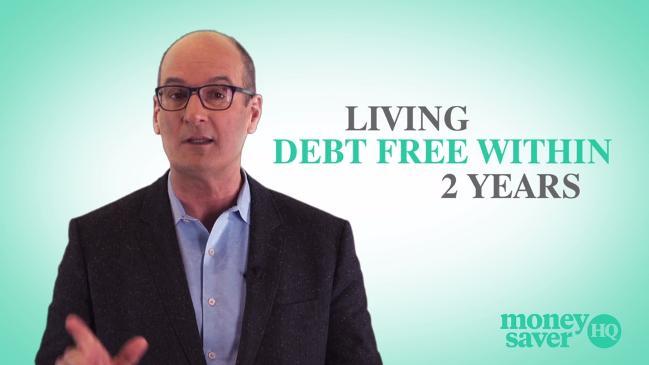Barefoot Investor: Wife in strife over credit card debt
WHEN a spouse reveals a secret credit card debt, marriage counselling should come before repayments. But Barefoot Investor Scott Pape has some advice for couples who find themselves in over their heads.

Barefoot Investor
Don't miss out on the headlines from Barefoot Investor. Followed categories will be added to My News.
WHEN a spouse reveals a secret credit card debt, marriage counselling should come before repayments. But Barefoot Investor Scott Pape has some advice for couples who find themselves in over their heads.
MY WIFE HAS BEEN LYING TO ME
HENRY ASKS: I have just discovered my wife has been lying to me for a long time about three credit cards that I thought she got rid of 15 years ago, now totalling $50,000+. Cue lots of tears and a big argument (in the car so the kids could not see us). She was very embarrassed and I was very angry, but I am over the angry stage now and just want to fix it. We have a household income of $180,000 a year, so we can afford to get on top of this. So, should I get a personal loan from CBA at 15.4 per cent variable or try and renegotiate with Amex ($15,000), David Jones ($1,500) and NAB ($35,000!) to get their rates down?

BAREFOOT REPLIES: Heavy stuff. I’d do a couple of things if I were you.
First, invest in marriage counselling. If you don’t get to the bottom of what’s driving her behaviour, there’s every chance you’ll end up with more debt in the future. Remember, she’s been lying to you, and racking up debt for 15 years — those habits are hard to break.
Second, don’t scoop in and save the day, dude. The only possible win I can see from this bad situation is if you come together and work through it as a team. So, here are a few things you should have on your menu for your next Barefoot Date Night:
Promise each other from this day forward you’ll never use credit again. In any form. In any circumstances.
Work out how much each month you can realistically put towards clearing these debts. It seems like you’re earning decent dough, so you should be able to get out from under this in less than five years.
And, you’re right, you do need to consolidate your debts and get a lower your rate. The cheapest way will be by refinancing your mortgage, so long as you have sufficient equity. Otherwise, an unsecured personal loan is your next best option. Grab a copy of your credit report (call Equifax on 13 83 32 or go online www.equifax.com.au), and, if there are no nasties on it, shoot for an unsecured rate of around 10 per cent (not 15.4 per cent).
Good luck.

TAKING CARE OF BUSINESS
MICK ASKS: I am 34 years old and have been given a huge offer by my boss to buy his company over a period of 5‒7 years, after laying down a deposit to buy in. My current position is Sales & Estimation Manager, which I have held for the past three years, with 12+ years in the company overall. It is a relatively small company — about $1 million turnover per annum — but quite profitable. What should I be looking into if I were to take up this offer? Or does it sound too good to be true?
BAREFOOT REPLIES: It sounds like your boss is looking to retire and have you buy him out via a multi-year ‘earn-out’. It could be a very good opportunity, but only if the investment stacks up. And there’s the rub — you need to evaluate this like any other investment you’d make.
So the first thing is to ask your boss is, “What price are you looking to sell the business for?”
When he tells you, ask him, “How did you come up with that price?” (Write down his answer.)
A good answer would be, “It’s a multiple of the current earnings”, or “Similar businesses are changing hands for roughly the same money”, or “It comes with X worth of property and equipment”.
A bad answer would be, “Well, that’s how much I need to comfortably retire”.
Then get the financials — the further back the better. You’re looking for the overall financial position of the business, the quality of the assets, and the stability of the profits, plus any opportunities you have to cut costs and boost profits. If figures aren’t your thing, go see a good accountant.
Finally, ask yourself the following questions:
“How reliant is the business on my boss staying on and bringing in the bucks?”
“Where do I think this business will be in 10 years’ time?”
“Where do I think the industry will be in 10 years’ time, and could it be disrupted?”
Then ask yourself the ultimate question:
You’ll likely have to work 10 hours a day, six days a week in this business. You’ll give up your entitlements, but you’ll still have to deal with entitled staff (there are always staff issues). And, you’ll have to invest a large amount of capital into it.
So, knowing all of this, how much do you have to earn, over and above your current wage, to make it worthwhile?

THE 8-YEAR-OLD HOME SAVER
JENNIE ASKS: I have an eight-year-old son passionately saving for his first home. He studies the real estate guide each week and is keen to look at properties. He does not receive in-hand pocket money but gets money from selling his ‘previously loved’ good-quality toys and doing odd jobs. He puts the majority of his money into the bank. Obviously, he has a number of years to go, so what would you recommend to keep him motivated?
BAREFOOT REPLIES: It sounds like you could have a little Donald Trump on your hands!
(Actually, that’s a horrible thing to say about a child. Apologies.)
Congratulations on raising such a passionate kid.
I have a few thoughts:
First, more is caught than taught, so he’s primarily going to learn from observing you. Don’t shy away from talking about your family finances at the dinner table. That’s how he’ll learn.
Second, be on the lookout for auctions in your area that you can take him to. It’s an awesome excuse to spend time with your son. Just remember to take a video for a momento.
Finally, it’s great that he’s so focused, but you should also teach him to be generous, hard-working and financially savvy.
How?
Well, earning money is only half the job.
Ideally, you want him to spend his money in ways that create experiences that teach him. So, encourage him to save up and buy something he wants (which will teach him goal-setting and stop him from hoarding his money and becoming a future tightwad), and encourage him to give some of the money away to a local charity (which will teach him to be generous).
At his age, pocket money is simply a tool for teaching financial education — and values, which will ultimately ensure your kid doesn’t end up anything like Donald Trump.

PART-TIME GIGS MAY LEAD TO A CLEARER PATH IN LIFE
A FRIEND of mine, a high school teacher, shocked me the other day.
“Our school has cancelled work experience for the year 10s this year,” he said.
“Hang on,” I said. “Why is it up to the school to arrange work experience?”
“Well, who else is going to do it?” was his reply.
It was at that point I had one of those moments when I realise I’m turning into my father: “Back in my day, I printed up my one-page resumé on a dot-matrix printer, plucked up some courage and approached employers myself!”
Admittedly, I was an “outlier”, because from a young age I actually knew that I wanted to work in finance. Anyway, I approached a local stockbroker and told him I could work a photocopier and make good coffee.
(Truthfully, I had no idea how to make coffee.)
Still, I got the gig and, more than that, the stockbroker became a mentor to me for years.
Fast forward six years and I scored a job at the Australian Stock Exchange (ASX), but not because I did work experience at a stockbroking firm. Rather it was because I was the only graduate who had years of work experience (and I was working on a building site straight after I graduated from uni).
Bottom line?
Employers like kids with a strong work ethic.
And a frightening number of kids make it through their schooling years without ever being exposed to work.
A kid needs to flip burgers!
So, here’s a tip to all the year 10s who are wondering what the hell they should do for their work experience. If you don’t have the foggiest about your career, use the week off class to try to score yourself some part-time work.
Create a resumé (use your school and sporting achievements in place of your non-existent work experience), and approach employers that hire high school kids.
Tell them you can work full time for a week for free (or the bargain basement price of $5 a day if that’s what your school demands).
If you do a good job, chances are they’ll hire you for an ongoing (paid) part-time gig.
And even if they don’t, you’ll have scored a glowing reference to use for your next job application. Win-win.
Tread Your Own Path!
If you have a burning money question, go to barefootinvestor.com and #askbarefoot.
The Barefoot Investor holds an Australian Financial Services Licence (302081). This is general advice only. It should not replace individual, independent, personal financial advice.
Originally published as Barefoot Investor: Wife in strife over credit card debt
